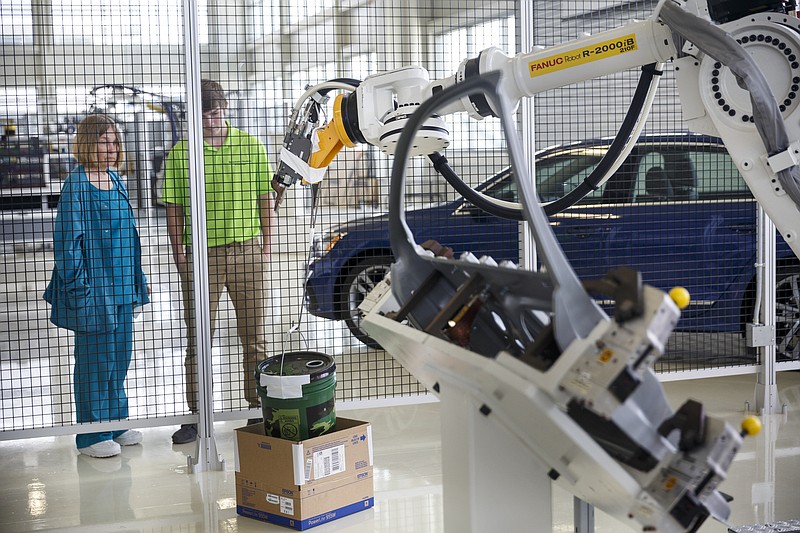Perhaps the distractions of the Trump administration's possible ties to Russia may have a silver lining for President Donald Trump.
Spygate may save Trump from the negative attention he should be getting sooner or later for being unable to fulfill his "Make America Great Again" promise of bringing back manufacturing jobs.
Even if Trump's administrative team could find the light switches in the West Wing, it cannot turn back the decades and bring back the time when manufacturing was done by Americans, not robots.
Chattanooga is a perfect example.
In our city's "Dynamo of Dixie" days in the 1960s, some 40 to 42 percent of all Chattanooga workers were employed in manufacturing in factories and foundries like U.S. Pipe where production depended on human muscle before the market moved from cast iron pipe to mass-produced plastic pipe. But today, despite this decade's addition of the Volkswagen plant and its suppliers here, our manufacturing jobs make up less than 12.8 percent of the workforce in the six-county metro Chattanooga area, according to the Bureau of Labor Statistics.
Despite what some, like Trump, want us to believe, the manufacturing jobs have not disappeared to Mexico as much as they have succumbed to robotics and technology.
Of today's 247,200 jobs in the Chattanooga area, only 31,600 are manufacturing jobs, yet the total output of manufactured goods in Chattanooga is up compared to what it was a half century ago when more than 102,000 of our workers held manufacturing jobs.
How? Because more production is being automated. And those robots are very hard workers.
And very disruptive - in a good way. At least it's good if you and your children are prepared.
VW's auto assembly plant here in 2011 employed about 2,000 people - along with some 383 robots. The robots make the plant about 77 percent automated, according to AutoObserver.
"There are 4,730 weld spots and 292 (robotic) welding guns. Output will be about 31 cars per hour," AutoObserver wrote in 2010 before the plant's production began the next year.
Imagine how many workers the plant would need without that 77 percent automation.
VW is not alone in the robotic worker field, of course.
A year-old study from the Boyd Center for Business and Economic Research at the University of Tennessee found that this "second machine age" will mean 1.4 million Tennessee jobs - or 50 percent of the state's current workforce - have a high probability of automation.
As this "second machine age" remakes workforce tasks and reallocates jobs, we and our youngsters have to change how we teach and learn.
That's part of the push behind both Chattanooga 2.0 and Tennessee Gov. Bill Haslam's Drive to 55 movement to increase the percentage of Tennesseans with college degrees or workforce skill certificates. Employers can find workers with the skills to operate, maintain and oversee the machinery.
"Due to technological developments, algorithms can do many tasks that were once viewed as uniquely human - such as writing news articles (gulp), driving cars and diagnosing illness. The labor market as we know it is on the verge of a paradigm shift," according to the state report."
Just as machines once overcame human physical limitations during the Industrial Revolution, artificial intelligence now has the potential to not only overcome unambiguous and uncreative tasks, but also less routine tasks currently performed by individuals in the labor force, the report states.
Don't scoff. Chattanooga leaders already are talking of long-range plans for roads with driverless cars. And scientists in Japan - desperate to replace dying-off bees needed to grow at least a third of our food crops - have turned tiny drones into remote-controlled pollinators by attaching horsehairs coated with a special, sticky gel to the drones' underbellies.
We've made a tiny start. About 50 Mechatronics students from Hamilton County schools are now enrolled in classes taught at Chattanooga's Volkswagen manufacturing plant where they will learn how to run and maintain industrial robots. We need more classes like this. We need more employers like this willing to invest in our kids and their future workers. Most of all, we need more local leaders and local parents clamoring for classes like this. And we need President Trump to understand that bringing back manufacturing begins in classrooms.
We've managed to get creative with making things. Now we must get creative with learning - learning to keep our jobs.
